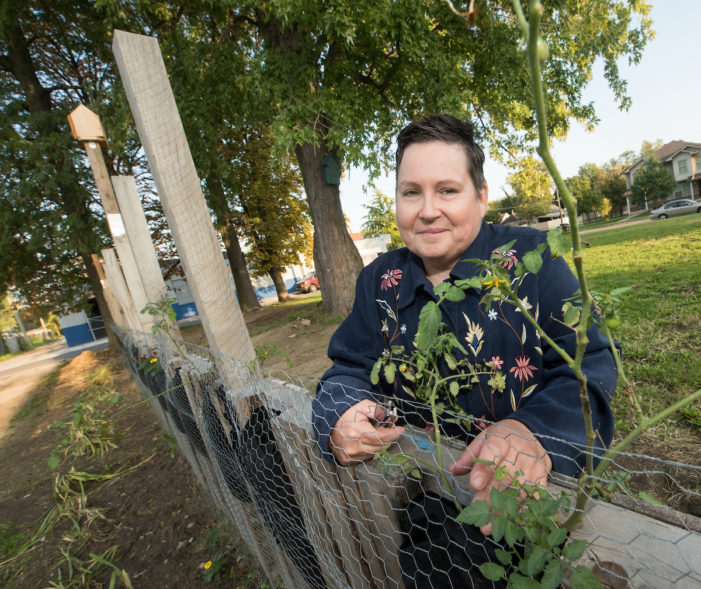Ann Byrne and other members the Springwells/Woodmere Block Club spent ARISE Detroit! Neighborhoods Day last year cleaning up one of the entrances to their neighborhood.
“It doesn’t reflect how we keep our homes. That’s one of the reasons we are out here,” she said during a joint interview with WWJ Newsradio and TheHUB.
The block club partnered with Urban Neighborhood Initiative and its Urban Forestry and Recreation Program. Junior forester rangers were partnered with trained adults to get things done.
It takes more than grit and determination to create neighborhood change. It takes help – and money.
Partnerships are essential. It takes more than grit and determination to create neighborhood change. It takes help – and money.
A lack of money shouldn’t mean you have to live with the problems in your neighborhood or that your idea for fixing things sits idle. For too long that’s been a common problem.
The Michigan State Housing Development Authority (MSHDA) hopes to get some of those ideas up and running. It will disperse up to $350,000 across the state through its new Neighborhood Enhancement Program to non-profits that dedicate themselves to the improvement of neighborhoods.
The program is designed to improve the quality of life of the residents of low or moderate income housing or of an area undergoing neighborhood conservation or renewal.
MSHDA is collecting proposals from any nonprofit (501c3) agency operating within a neighborhood in the State of Michigan right now. You must be able to mobilize and get things done quickly.
Here are the three eligible categories and examples of possible fix-ups:
Beautification
- Houses – paint blitz
- Front porch improvements
- Taking care of “eye sores,” which are agreed upon by the community and have been properly vetted
- Gateway or main entrance improvements
- Grass roots housing initiatives, housing infrastructure.
Neighborhood Public Amenity
- Park, pocket park, and local farmer’s market enhancements
- Community gardens and abandoned lots
- Streetscape/bike paths/non-motor infrastructure repair
- Walkway improvements to public amenities
Infrastructure Enhancement
- Creating accessibility renovations and enhancements and disability accommodations
- Senior housing accessibility renovations and enhancements
- Homeowner rehabilitation of single-family owner occupied homes
If your non-profit has ideas that fall into those categories please complete the RFP and submit it to MSHDA at 735 East Michigan Avenue, Lansing, MI 48912 no later than March 15, 2017.
Click here for the application.
Click here for the program chart.
If you are unable to access the information from the links above, please go to the MSHDA website, Select Neighborhoods, Select NOFA and Grant Programs.
“MSHDA is thrilled to be able to offer these competitive grants to nonprofits across the state that are focused on neighborhood stabilization and enhancement activities,” says Katie Bach, communications director for MSHDA.
“These funds will result in highly visible, impactful changes that will mean so much to residents’ qualify of life. The potential success of the program is heightened by the buy-in at the local level and demonstrated support within each neighborhood and community at large. The goal of this funding is to assist and later showcase model Michigan neighborhoods where people are engaged and facilitating change,” she says.
To be considered your neighborhood must have least 51 percent of its residents at or below 80 percent of the median income that was determined by the US Department of Housing and Urban Development. That can be checked by clicking here.
Multiple neighborhoods can be included in your proposal, but there must be a major impact on each neighborhood. You need to prioritize the projects but MSHDA may decide to do only a part of the proposal.
Remember, if there is an agency within the government that covers your activity, it will not be eligible.
Prohibited programs include:
- Demolition
- Land acquisition
- Downtown oriented activities such as streetscape/façade
- Non-housing oriented activities
- Gap financing for multi-family tax credit deals
- Match for crowdfunding
- Technical assistance
- Emergency funding
- Infrastructure such as streets, curbs, gutters, sidewalk
- Job training.
Here is some additional information:
- The minimum program allocation is $2,500 per agency. Multiple activities of smaller amounts can be combined to reach this minimum threshold.
- The maximum program allocation is $50,000 per agency. Multiple activities of smaller amounts can be combined but cannot exceed the maximum threshold.
- Up to 10 percent of the grant award may be used for documented and itemized program planning and administration.
- All cost overruns are the responsibility of the nonprofit agency and cannot be covered by MSHDA.
If you have questions please contact the MSHDA office at 517-335-2524 or send an e-mail to HIDmailbox@michigan.gov. Please put Housing Initiatives Statewide RFP question in the subject line. Answers will be posted on the MSHDA website under Neighborhoods, NOFA, and Grant Programs on or before Monday, February 27, 2017.
All proposals must be submitted with three color copies by 5:00pm Wednesday, March 15, 2017. They can be sent electronically to HIDMailbox@Michigan.gov, or a physical copy can be sent to MSHDA at 735 East Michigan ave., Lansing, MI 48912.
Photo by Paul Engstrom


